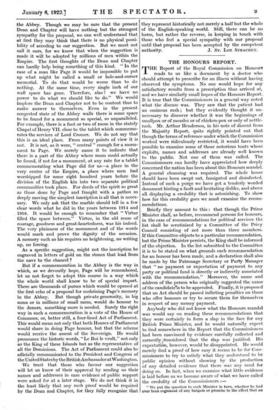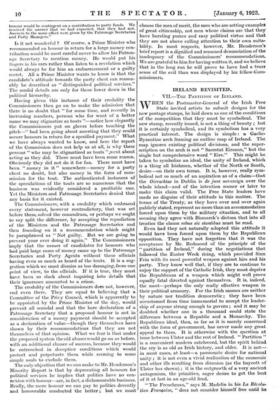THE HONOURS REPORT.
THE Report of the Royal Commission on Honours reads to us like a document by a doctor who should attempt to prescribe for an illness without having observed the symptoms. No one would hope for any satisfactory results from a prescription thus arrived at, and we have similarly small hopes of the Honours Report. It is true that the Commissioners in a general way noted what the disease was. They saw that the patient had an ominous rash ; but they evidently thought it un- necessary to discover whether it was the beginnings of smallpox or of measles or of chicken-pox or only of nettle- rash. Mr. Arthur Henderson, in his note of dissent from the Majority Report, quite rightly pointed out that though the terms of reference under which the Commission worked were ridiculously restricted, it would have been possible to examine some of those notorious touts whose exploits, names and addresses are already well known to the public. Not one of them was called. The Commissioners can hardly have appreciated how deeply concerned the nation has been about this Honours scandal. A general cleansing was required. The whole house should have .been swept out, fumigated and disinfected. Instead of such a purge we have got a tenderly worded document hinting a fault and hesitating dislike, and above all displaying a credulity that is astonishing. To show how far this credulity goes we must examine the recom- mendations.
Briefly they amount to this : that though the Prime Minister shall, as before, recommend persons for honours, in the case of recommendations for political services the list shall be scrutinized by a Committee of the Privy Council consisting of not more than three members. If this Committee objects to a particular recommendation, but the Prime Minister persists, the King shall be informed of the objection. In the list submitted to the Committee it is to be stated on what grounds each recommendation for an honour has been made, and a declaration shall also be made by the Patronage Secretary or Party Manager that " no payment or expectation of payment to any party or political fund is directly or indirectly associated with the recommendation." Moreover, the name and address of the person who originally suggested the name of the candidate's to be appended. Finally, it is proposed that an Act should be passed inflicting penalties on those who offer honours or try to secure them for themselves in respect of any money payment.
Anybody who did not know what the Honours scandal was would say on reading these recommendations that they were certainly in form a slap in the face for any British Prime Minister, and he would naturally expect to find somewhere in the Report that the Commissioners had been convinced by evidence carefully collected and earnestlyponsidered that the slap was justified. His expectation, however, would be disappointed. He would merely find a proof of how easy it seems to be for Com- missioners to try to satisfy what they understand to be public opinion without showing by the production of any detailed evidence that there was any need for doing so. In fact, when we examine what little evidence is laid before us we become aware of what we have called the credulity of the Commissioners :- " We put the question to each Minister in turn, whether he had ever been cognizant of any bargain or promise to the effect that an
honour would be contingent on a contribution to party funds. We received the answer that we had expected, that they had not. Answers to the same effect were given by the Patronage Secretaries and Party Managers."
Is it not wonderful ? Of course, a Prime Minister who recommended an honour in return for a large money con- tribution would be most careful never to allow his Patron- age Secretary to mention money. He would put his fingers in his ears rather than listen to a revelation which would always be for him an embarrassment or a guilty secret. All a Prime Minister -wants to know is that the candidate's attitude towards the party chest can reason- ably be described as " distinguished political services." The sordid details are only for those lower down in the political hierarchy.
Having given this instance of their credulity the Commissioners then go on to make the admission that there is no doubt that " for some time, and recently in increasing numbers, persons who for want of a better name we may stigmatize as touts "—notice how elegantly the Commissioners put on gloves before touching the pitch—" had been going about asserting that they could secure honours in return for a specified payment." What we have always wanted to know, and here the report of the Commission does not help us at all, is why these persons " who may be stigmatized as touts ",went about acting as they did. There must have been some reason. Obviously they did not do it for fun. There must have been " money in it " somewhere—money for a party chest no doubt, but also money in the form of com- mission for the tout. The authenticated instances of the speculations of the touts are so numerous that the business was evidently considered a profitable one. Yet the Ministers and Patronage Secretaries denied that any basis for it existed.
The Commissioners, with a credulity which embraced every statement, however contradictory, that was set before them, solved the conundrum, or perhaps we ought to say split the difference, by accepting the repudiation of the Ministers and the Patronage Secretaries and then founding on it a recommendation which might be paraphrased as " Not guilty. But we are going to prevent your ever doing it again." The Commissioners imply that the names of candidates for honours who had paid large sums of money came up to the Patronage Secretaries and Party Agents without these official; having even so much as heard of the touts. It is a sug- gestion which we must dismiss as too damaging, from one point of view, to the officials. If it is true, they must have been so slack about inquiring into details that their ignorance amounted to a crime.
The credulity of the Commissioners does not, however, end even there. They are equal to believing that a Committee of the Privy Council, which is apparently to be appointed by the Prime Minister of the day, would prevent all scandal and that the bare declaration of a Patronage Secretary that a proposed honour is not in consideration of a money payment should be accepted as a declaration of value—though they themselves have shown by their recommendations that they are not themselves of that opinion. What we fear is that under the proposed system the old abuses would go on as before, with an additional chance of success, because they would be entrenched in deceptive conditions which would protect and perpetuate them while seeming to some simple souls to exclude them.
The only objection that we can make to Mr. Henderson's Minority Report is that by deprecating all honours for political services he implies that politics have no con- nexion with honour—are, in fact, a dishonourable business. Really, the more honour we can pay to politics decently and honourably conducted the better ; but we must choose the men of merit, the men who are setting examples of great citizenship, not men whose claim; are that they have bursting purses and easy political virtue and that they are not above calling attention to their own suita- bility. In most respects, however, Mr. Henderson's brief report is a dignified and reasoned denunciation of the inadequacy of the Commissioners' recommendations. We are grateful to him for having written it, and we believe that in the long run he will prove to have had a truer sense of the evil than was displayed by his fellow-Com- missioners.



















































 Previous page
Previous page